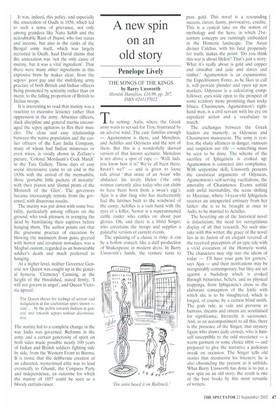A new spin on an old story
Penelope Lively
THE SONGS OF THE KINGS by Barry Unsworth Hamish Hamilton, £16.99, pp. 207, ISBN 0241137012 The setting: Aulis, where the Greek army waits to set sail for Troy, frustrated by an adverse wind. The cast: familiar enough — Agamemnon is there, and Menelaus, and Achilles and Odysseus and the rest of them. But this is a wonderfully skewed version of that known scenario. Menelaus is not above a spot of rape — 'Well, lads, you know how it is? We've all been there, haven't we?' — and is given to loose talk about 'that swine of an Asian' who abducted his lovely Helen ('the only woman currently alive today who can claim to have been horn from a swan's egg'). Ajax is a dim thug who has inadvertently had the latrines built to the windward of the camp, Achilles is a vain hunk with the eyes of a killer, Nestor is a superannuated cattle raider who rattles on about past glories. Oh, and there is a blind Singer, who entertains the troops and supplies a palatable version of current events.
The updating of a classic is risky: it can be a hollow conceit, like a duff production of Shakespeare in modern dress. In Barry Unsworth's hands, the venture turns to pure gold. This novel is a resounding success, clever, funny, provocative, erudite. This is a cynical take on the notion of mythology and the hero, in which 21stcentury concepts are cunningly embedded in the Homeric landscape, The Asian diviner Calchas, with his fatal propensity for truth, makes the point: 'Do you think this war is about Helen? That's just a story. What it's really about is gold and copper and cinnabar and jade and slaves and timber.' Agamemnon is an expansionist: the Expeditionary Force, as he likes to call it, will provide plunder and open up new markets. Odysseus is a calculating campfollower, eyes wide open to the prospect of some territory more promising than rocky Ithaca. Chasimenos, Agamemnon's righthand man, is a civil servant with his eye on expedient action and a vocabulary to match.
The exchanges between the Greek leaders are masterly, as Odysseus and Chasimenos manoeuvre. The army is restless, the shaky alliances in danger, rumours and suspicion are rife — something must be seen to be done. The scheme of the sacrifice of Iphigeneia is cooked up; Agamemnon is cornered into compliance. With serpentine skill, Unsworth presents the casuistical arguments of Odysseus, Agamemnon's self-serving vacillations, the amorality of Chasimenos, Events unfold with awful inevitability, the scene shifting to Mycenae, where 14-year-old Iphigeneia receives an unexpected emissary from her father: she is to be brought at once to Aulis, to be married to Achilles.
The besetting sin of the historical novel is didacticism, the need for surreptitious display of all that research. No such mistake with this writer; the grace of the novel lies in its fusion of an elegant reversal of the received perception of an epic tale with a vivid evocation of the Homeric world. The characters may slip into the idiom of today — 'I'll have your guts for garters,' says Ajax — and their motivations may be recognisably contemporary, but they are set against a backdrop which is evoked through behaviour, beliefs, and its physical trappings, from Iphigeneia's dress to the elaborate conception of the knife with which she is to be slaughtered, which is forged, of course, by a certain blind smith. The gods rule, as vain and perverse as humans, dreams and omens are scrutinised for significance, hierarchy is sacrosanct. And, as an accompaniment to all this, there is the presence of the Singer, that mystery figure who draws daily crowds, who is himself susceptible to the odd sweetener — a warm garment or some choice titbit — and prepared to give the narrative a judicious tweak on occasion. The Singer tells old stories that mesmerise his listeners; he is also chronicling the present as it unfolds. What Barry Unsworth has done is to put a new spin on an old story; the result is one of the best books by this most versatile of writers.










































































 Previous page
Previous page